- Author Jason Gerald gerald@how-what-advice.com.
- Public 2023-12-16 10:50.
- Last modified 2025-01-23 12:04.
If you notice that you are often rude to other people, you may be dealing with emotional problems of your own. Recognizing the source of your negative emotions and making yourself happier can help you develop a kinder, more outgoing personality. In addition, learning to communicate with others and understand others can also help reduce the chance that you may (unintentionally) be rude in certain situations. Of course you can change your thoughts, feelings, and actions, so that you become a better and kinder person.
Step
Method 1 of 3: Mastering Your Emotions

Step 1. Think about why you are being rude
Many people are rude to others so they can feel better themselves. However, this approach is not very effective, especially if you want to be nice to other people. You may nag someone and feel more comfortable afterwards, but that comfort is only temporary because you later feel sorry for nagging or yelling at that person. Other reasons why you might be rude include:
- You can't control your own negative emotions, so you vent them by nagging or yelling at others.
- You feel your ego is being threatened, so you protect yourself by being rude.
- You are jealous of someone's accomplishments or life, so you want to hurt them.
- You project negative feelings or thoughts about yourself onto another person (as if that person had negative thoughts or feelings about you).
- You try to be unique and different from other people by pointing out your differences in a rude way.
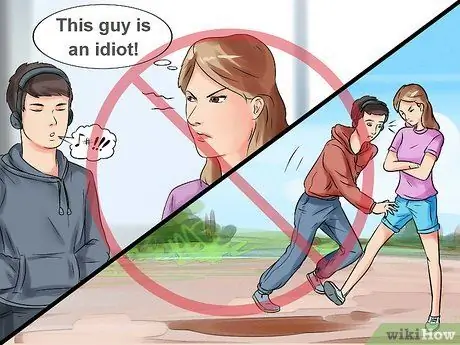
Step 2. Recognize that thoughts, feelings, and actions are connected
Sometimes, it is difficult to distinguish between thoughts and feelings. In reality, the two are related: your thoughts affect how you feel. Meanwhile, your feelings can influence the actions you take. Therefore, if you want to change your actions (or your words), start by changing your thoughts.
- For example, if you think, “This person is stupid!” You will feel pressured or lazy if you have to talk to him, and those thoughts will be reflected in your words or actions. However, if you think “This person needs to learn more on this topic,” you may be more motivated to teach him or her, and your patience will be reflected in what you say.
- Keep in mind that even if you feel like you can't control your thoughts and feelings, you can still determine how you will act. Every time you speak or act, you make choices about what words or actions to use or do.
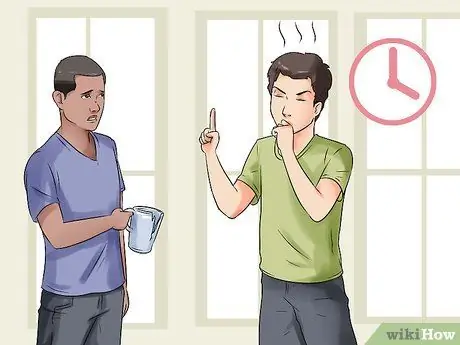
Step 3. Control your emotions before speaking
If you're talking to someone and feel like you're going to be rude to them, think about it for a moment before you respond. If you think before you speak, you are more likely to give the person a productive response (thus reducing the chances of being rude).
If you're feeling angry, upset, hurt, or sad, you may need to wait before you talk to the other person again. These emotions can get in the way of positive communication and cause you to vent your anger by nagging or yelling at the other person

Step 4. Keep a ‘good attitude’ journal
Keep a journal about how you interact with people throughout the day. If you were rude on one occasion, try to remember details of the incident, such as who you were rude to, why you were rude, what you said, and whether there was anything in the past that made you rude. If you can be nice and friendly to other people, especially in situations that would normally provoke you to be rude, then reward yourself for being nice.
Taking notes about rude behavior can help you identify whether there are people, events, or environments that have the potential to trigger you to be rude. By recognizing these triggers, you can work to improve your attitude or behavior when dealing with those trigger situations in the future
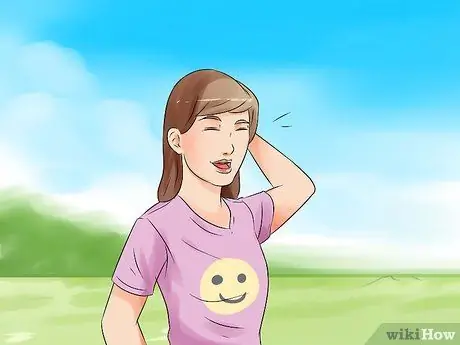
Step 5. Build a sense of humor
The ability to laugh easily with other people (rather than laughing at others) can help you reduce the chances of being rude. If you're starting to get impatient and, it seems, you're about to be rude to someone, try to find reasons to laugh. Looking for the humorous side of a situation or remembering something that made you laugh can change how you view the situation, because your body's chemical reactions will change, from angry or negative feelings to humor.
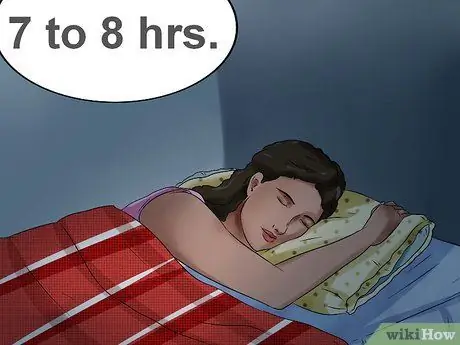
Step 6. Get a good night's sleep
You need enough sleep (at least 7-8 hours) each night to feel better. Lack of sleep can lead to various health problems, including the inability to control emotions properly. Therefore, getting enough sleep can help you build the patience and understanding to be kind to others, regardless of your emotional state.
If you have chronic sleep problems, talk to your doctor or pharmacist about safe sleeping pills. Alternatively, change your diet, such as reducing the consumption of products containing caffeine and sugar, or change your lifestyle, such as reducing the frequency of watching television or working in front of a screen at night, so that you can sleep better at night
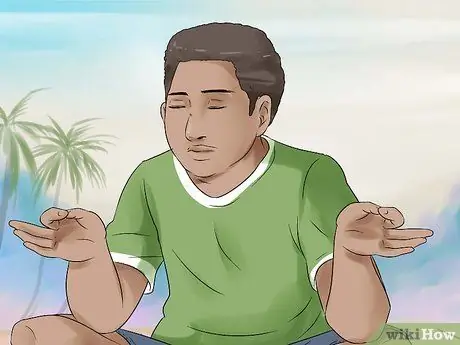
Step 7. Meditate before you face situations or conversations that may depress you
Meditation can help control your emotions, so you can be kinder and kinder. If you feel (as if) you're about to be unkind to someone out of anger or impatience, take a moment to meditate to refresh your mind. Find a quiet place to be alone, then follow these steps:
- Breathe deeply and slowly. By breathing deeply, your heart rate will slow down so you feel calmer. Also, your breath should be deep enough that your stomach expands as you inhale.
- Imagine the light filling your body as you inhale. Imagine the light filling and calming your mind. As you exhale, imagine dark and dull auras emitting from your body.
- Once you feel calmer, you will be better prepared to talk to other people in a friendly manner.
Method 2 of 3: Be Kinder to Others
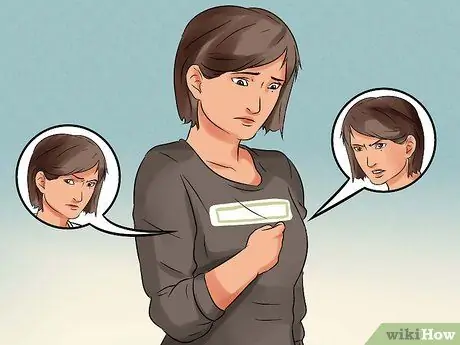
Step 1. Understand that rudeness comes from within you
Most people are rude to others when they feel threatened, humiliated or belittled, or oppressed. By realizing that your rude behavior is your own problem (and not someone else's), you can determine if your abusive speech or behavior is appropriate in certain situations.
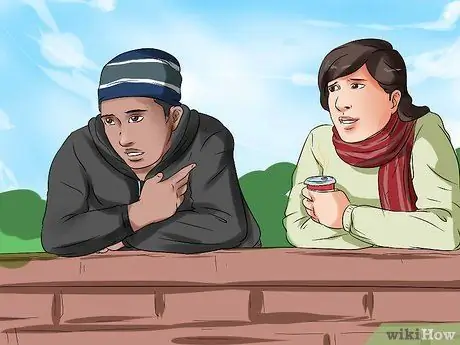
Step 2. Develop empathy for others
Empathy can help you prioritize being kind and friendly to others. In addition, empathy can also help you understand certain situations from the other person's point of view, make you feel sad for other people's difficulties, and be able to feel other people's emotions. Whatever approach you use, make sure your focus is on understanding and relating yourself to the other person.
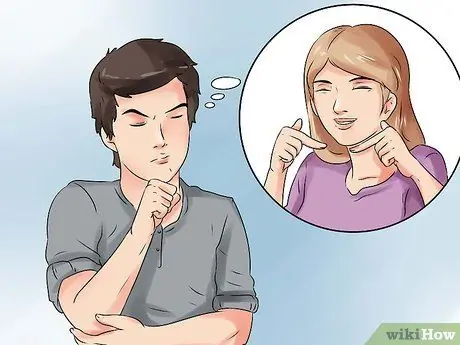
Step 3. Imagine the person you are a role model for
Find someone who inspires you through their words or actions, then imagine what they would do or say in certain situations. After that, try to imitate and practice the way that person communicates in your life.
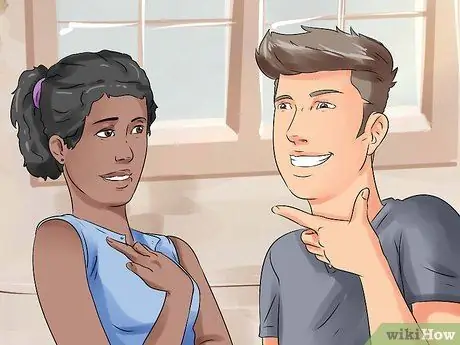
Step 4. Smile at others
By smiling, you will appear friendlier. Other people are more likely to smile back at you and make friendships easier. In addition, smiling also makes you feel happier. Showing happiness through good posture and a smile can improve the quality of your mood, because your thoughts and feelings will respond in accordance with the smile you show.
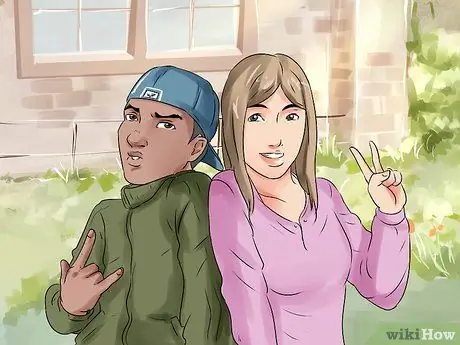
Step 5. Use positive body language
Communication doesn't just involve speech. You may speak very politely, but your body language or actions may be viewed negatively by others. Negative feelings towards other people can be expressed through your body because your body sends signals to that person that you are uncomfortable.
To keep your body language neutral, try progressive muscle relaxation. In progressive muscle relaxation, you tighten then relax the muscles of your body. Apart from refreshing your body, this relaxation also helps to remove negative thoughts and stress from your mind

Step 6. Express your feelings assertively if necessary
Instead of showing your emotions passively (getting angry without saying anything) or aggressively (exploding your anger in inappropriate ways), try to communicate your feelings in a firm manner. To express your feelings in a firm way, explain your desire (not demand) using pertinent facts (not emotional outbursts) in a polite manner. Communicate clearly and express your feelings effectively so that everyone's wants and needs are met.
For example, if you tend to yell at your partner when he or she folds your clothes the wrong way, try to show your emotions in a firm way. You can say, “I appreciate your effort to help me fold my clothes, but I'm annoyed with the way you fold my pants, so they get wrinkled. Honestly with wrinkled pants, I looked unprofessional when I wore them to the office. I would be happier if you folded them more carefully, or if you let me wash and fold my clothes myself.”
Method 3 of 3: Improve Your Overall Mood

Step 1. Do something you enjoy
Taking care of yourself by doing activities that you enjoy can help to form a better and kinder person. By doing activities that you enjoy, you will be in a better mood because your mind is distracted from bad moods. If you can control your mood, chances are you can make wise decisions (not decisions based on emotions) about how to communicate with other people.
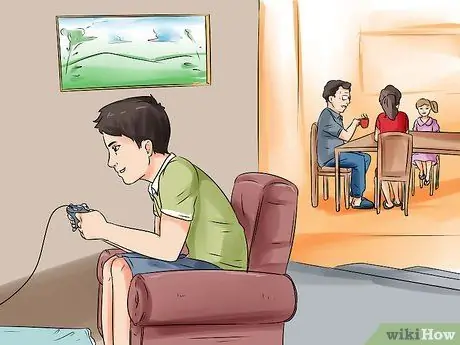
Step 2. Take your own time
From time to time, you need to spend some time alone, especially if you are an introvert. This will hopefully help you form a more welcoming personality because, mentally, you will feel more refreshed and comfortable. In addition, this can also provide benefits in itself, especially if the people you care about are often victims of your rude behavior. By 'hiding' for a while, you can become a kinder person to these people.

Step 3. Read a book or watch your favorite television show
Some research shows that experiencing the experience through another person or person (eg through a character from a favorite book or television show) can make a person feel happier. The person can also experience catharsis, or emotional release through a second party, by experiencing certain experiences through the character. By releasing your emotions in a controlled environment, you can control your own emotions in real life.
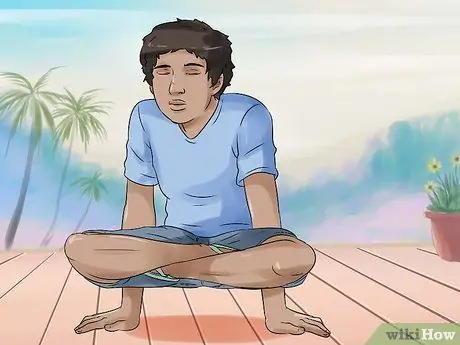
Step 4. Exercise
There is a strong relationship between regular exercise and improved mood. Regular exercise can help control your overall mood. By exercising regularly, you can feel happier, so you can be kinder and kinder to others.
- Try practicing yoga. Yoga combines physical exercise and emotional awareness, so it has the benefits that exist in both exercise and meditation. If you don't have a yoga studio in your city, try watching yoga videos uploaded to the internet or downloading a yoga app to your device.
- If you want to do something more unique, try dancing to make yourself feel better. By dancing, you can get the benefits obtained by exercising, and the cells in the brain that promote feelings of happiness are also activated.
- By exercising daily, you can feel an overall boost of energy. This energy can help you to be more productive and patient, and less easily irritated by others.

Step 5. Eat a healthy meal or snack
Hunger can irritate you, which can lead you to nag at other people. To make you feel healthier and happier, try eating a nutritious diet.
- Add whole grains, fruits, vegetables, and protein to your diet. In addition, eating foods that contain healthy fats can also help you feel full longer.
- Avoid consuming highly processed or fat-free foods. These foods are often not very nutritious, so you will feel less satisfied.
- Foods that contain anti-inflammatory properties and contain Omega-3 fatty acids can also help make you feel happier. Some foods (and drinks) that fall into this category include green vegetables, avocados, asparagus, walnuts, dark chocolate, and green tea.

Step 6. Socialize with friends
You may vent your frustration on others because you feel isolated. Therefore, spending time with friends in person can be a good way to lift your mood if you feel distant from your friends. Go out to lunch together or have a drink at a cafe you like, or have dinner together. If you don't have the money to go out to eat with your friends, you can spend some time with them by walking in the park and sitting on the swings and chatting.
If you can't meet or spend time with your friends in person, try chatting with your friends (especially interesting and funny friends) over the phone to get your mood up quickly
Tips
- Think carefully what you want to say. Don't just say the first thing that just pops into your mind because it won't make things better.
- Resist yourself from judging other people for granted. Judging others negatively can be a source of negative thoughts about other people. These thoughts can be reflected through your interactions with the person concerned.
- Be a good listener. Listen to what people tell you.
- Tell yourself that you are a kind and friendly person so that your mind begins to accept you. Change your behavior and attitude to fit the new 'standard'. Thinking that you are a good person (and not a bad person) can really make a difference to your actions. Your mind will react positively.
- It may be difficult to stop being rude, as it is when you break other bad habits. However, with persistence you can turn that rude attitude into a friendlier one.
- Be polite, patient, loyal, and caring. Don't forget to be positive. Don't be negative or overly critical. Always look for the positive side in every situation.
- Be sincere. Don't be nice just because you have a purpose. If you're just being nice to get special treatment, it doesn't count as good behavior; it is a superficial and evil deception. Be nice and friendly because you reflect on what happened and know that, after all, you were a good person.
- Before doing anything, immediately ask yourself this question: “Would these thoughts, actions, or comments make the world a better place for me, or someone else?” Otherwise, you should not show the action or make the comments and just keep those thoughts. There's no point in putting forth effort that makes you and others unhappy.
- Whatever you do, never bully others.
- Be a proud person. You don't have to be rude to other people just because someone was rude to you.
- You don't have to compliment people a lot, just because you want to stop being rude. You just need to talk to other people with respect.
- If someone is being rude to you, you need to defend yourself, but of course in a non-violent way.
- Before you speak, consider the concept of 'T. H. I. N. K' (true, helpful, inspiring, necessary, and kind). This means, think about whether your words are true, useful, inspiring, needless to say, and are positive or kind?
- Try to be helpful, be nice and friendly, but (if necessary) show your stand.






